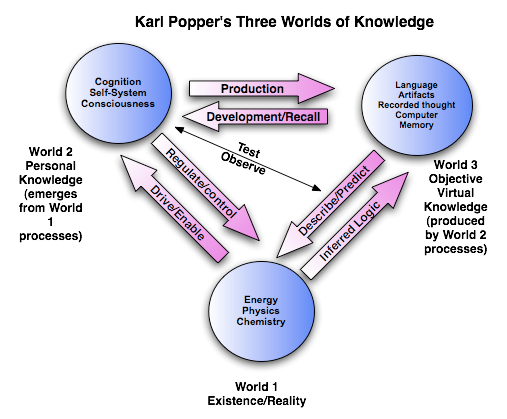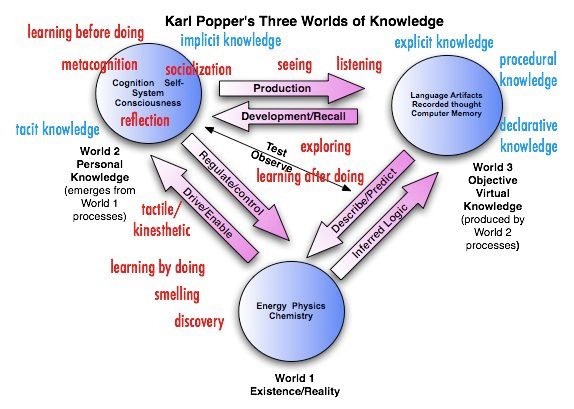ATD Blog
The Three Worlds of Knowledge
Fri Jun 23 2006


This post is chained to Peter Isackson's, Saving "knowing" from imminent execution, which is chained to Clark Aldrich's Dead Reckoning. To get beyond what Peter and Clark have described as a "static" and "freeze-dried world of knowledge and Jay and Clark's comments on "knowledge" and "meaning," we need to look at other models. While this is not meant as a complete answer, I believe it moves it in the right direction.
"What is the object of knowledge?" asks young Grasshopper. "There is no object of knowledge," replies the old Shaman, "To know is to be able to operate adequately in an individual or cooperative situation." "So which is more important, to know or to do?" asks young Grasshopper. "All doing is knowing, and all knowing is doing," replies the Sage, and then continues, "Knowing is an effective action, that is, knowledge operate effectively in the domain of existence of all living creatures." \[paraphrased from Maturana & Varela\].
One of the most popular epistemology models (except in the behavioral sciences) is Sir Karl Popper's writtings on the Three Worlds of Knowledge. The knowledge/learning/management professions seem to prefer and stay within the realm of Michael Polanyi's concept of personal and tacit knowledge. However, Polanyi's epistemology is narrower and has a limited basis for understanding knowledge as compared to Popper's work, which provides a broader epistemological foundation.
Click to enlarge
Karl Popper theorizes that there are three worlds of knowledge:
World 1 is the physical universe. It consists of the actual truth and reality that we try to represent, such as energy, physics, and chemistry. We may exist in this world, however, we do not always perceive it and then represent it correctly.
World 2 is the world of our subjective personal perceptions, experiences, and cognition. It is what we think about the world as we try to map, represent, and anticipate or hypotheses in order to maintain our existence in an every changing place. Personal knowledge and memory form this world, which are based on self-regulation, cognition, consciousness, dispositions, and processes. Note that Polanyi's theory of knowledge is based entirely within this world.
World 3 is the sum total of the objective abstract products of the human mind. It consists of such artifacts as books, tools, theories, models, libraries, computers, and networks. It is quite a diverse mixture that ranges from a claw-hammer to Maslow's hierarchy to Godel's proof of the incompleteness of arithmetic. While knowledge may be created and produced by World 2 activities, its artifacts are stored in this world. Popper also includes genetic heredity (if you think about it, genes are really nothing more than a biological artifact of instructions).
And of course, there are various relationships between these three worlds:
World 1 drives and enables world 2 to exist, while world 2 tries to control and regulate world 1.
World 2 produces world 3, while world 3 helps in the recall and the training/education/development/learning of world 2.
World 3 describes and predicts world 1, while world 1 is the inferred logic of world 3.
In addition, since world 2 is composed of people, we can use our senses to cut across boundaries and observe and test the exchanges and relationships of worlds 1 and 2.
Thus, knowledge surrounds us (world 1), becomes a part of us (world 2), and is then stored in historical contents and contexts by us (world 3 artifacts).
In this framework are two different senses of knowledge or thought:
Knowledge in the subjective sense, consisting of a state of mind with a disposition to behave or to react \[cognition\].
knowledge in an objective sense, consisting of the expression of problems, theories, and arguments.
While the first is personal, the second is totally independent of anybody's claim to know -- it is knowledge without a knowing subject.
A T ~ T H E ~ F I S H H O U S E S
by Elizabeth Bishop
It is like what we imagine knowledge to be:
dark, salt, clear moving, utterly free,
drawn from the cold hard mouth
of the world, derived from the rocky breasts
forever, flowing and drawn, and since
our knowledge is historical, flowing, and flown.
Thus, knowledge goes far beyond the knowing/doing dichotomy. . . it is drawn, derived, flowing, historical, and forever.
Click to enlarge
A few examples:
S E N S E S
Give a baby an object and one of the first things they normally do is "mouth" it. While this is sometimes done to massage their gums due to cutting teeth, it is also performed to learn about the object. Babies are just as curious about their surroundings as we are. The mouth and tongue are filled with sesitive nerve endings that allow them to not only feel, but also taste objects. Thus our first learnings are done by hearing, seeing, tasting, and feeling not only our hands, but also with our mouths.
Our senses are basically multifaceted in that we learn about world 1 through our senses and then create world 3 artifacts within world 2, which in turn helps others in their quest of learning by using their senses to understand world 3 artifacts in order to live more productively within world 1 (whew -- what a breath full). In addition, we test the interrelations of worlds 1 and 2 with our senses.
M I R R O R ~ N E U R O N S
Our brain contains a special class of cells, called mirror neurons, that fire not only when we see or hear an action, but also when we carry out the same action on our own. Our survival depends on understanding the actions, intentions and emotions of others, and by using these special mirror neurons, we are able to grasp the minds of others through direct simulation, rather than through conceptual reasoning. Thus knowing and doing become one -- at least in our minds!
Mirror neurons reveal how we partly learn; why people respond to certain types of sports, dance, music and art; why watching media violence may be harmful; and why we may like voyeurism or pornography. We are simply hardwired for imitation.
For more information, see the video and audio clips.
L I S T E N I N G
Listening is instinctual -- we can automatically home in on specific conversations at large gatherings. And as Chomsky theorized, it is hard-wired within us for children do not really learn to understand the spoken word, they just do it. In addition, listening frees our hands and eyes so we can take notes, draw mind maps, and do other useful things with our hands (create 3rd world artifacts).
People normally enjoy listening to others. . . it is part of our social nature. Listening to someone directly can often be quite special to many, because rather than going through a world 3 artifact to gain insights to other's knowledge, we remain in world 2 and thus get it straight from the cognitive source, rather than an artifact. Plus, we can directly interact with the person through the use of questions, gestures, and other interactive means.
